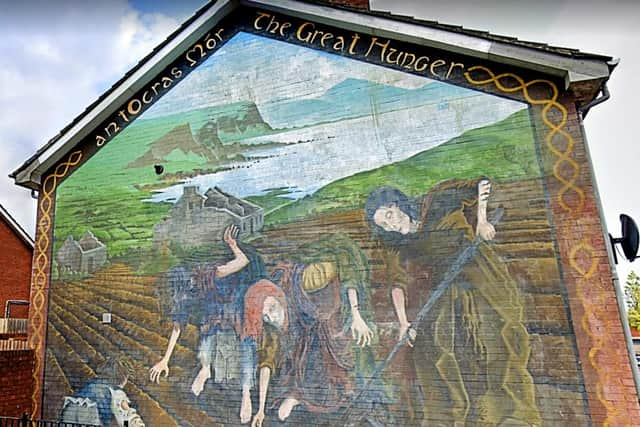'Last time round it was a Brit-bashing exercise': TUV man explains why he objects to famine commemoration in Belfast
and live on Freeview channel 276
City councillor Ron McDowell said that he was the sole objector to the motion on the 21-strong Standards and Business Committee.
The motion said that the committee would write to the Dublin government to “request that Belfast hosts the National Famine Memorial Day in May 2024”, and was proposed and seconded by SDLP men Carl Whyte and Paul Doherty, respectively.
Advertisement
Hide AdAdvertisement
Hide AdCouncillor McDowell, a history enthusiast who has helped create the heritage centre at Belfast’s Clifton Street Orange Hall, said the request had been sent despite there being no information about what the event would involve, if or how costs would be split, or who the main speaker would be.


“This is an Irish government national day of commemoration; this isn't something that's in the NI or UK calendar,” he told the News Letter.
"It takes place in each of the four provinces of Ireland – Ulster, Munster, Leinster and Connaught – and it's supposed to be on a rotational basis, so it's supposed to travel around.
"This year it was held in Donegal. Michael D Higgins was speaker at it, with the Irish army, and it was all a very civic affair...
Advertisement
Hide AdAdvertisement
Hide Ad“I watched the event online, and you get into long periods of British-bashing basically: bashing the British, what the British didn't do, what the British did when they sent their corn away – and, for me, I found that quite offensive.
"And when they talk about 'the British', they didn't talk about 'the British government', they didn't talk about 'some of the rich' – they talked about 'the British'.
“But at that time, and still today, we are the British! We are British in Ireland, and we were affected badly by the famine.
“In Ulster, I think there was 110,000 people who lost their lives. The Presbyterians in Armagh were decimated. There were Grand Orange Lodge reports talking about the blight in Co Tyrone.
Advertisement
Hide AdAdvertisement
Hide Ad"On the Shankill Road, there were reports of vagrants dying at the end of Mateer Street. They were buying them that deep in the Shankill graveyard that there were two inches of soil covering the bodies, and all those horror stories.
“And that happened to 'the British'!”
He added: “If we relate that to a national day of commemoration, do we have anything like that? Well, we do obviously: Armistice Day.
“The comparison between the two is quite stark. On Armistice Day, we don't spend the day bashing Germans.”
Asked if he might support it if the UK government jointly hosted it, he said: “You're talking to a TUV councillor, so anything that's going to be cross-jurisdictional, we're going to run a mile from.”
Advertisement
Hide AdAdvertisement
Hide AdIt was put to him that many argue that more should have been done, and since the island as a whole was under British jurisdiction, that fell to the British government.
“It's a fact: more could have been done,” he said.
"But I think it comes down more to an issue of the rich and the poor, rather than any nefarious element to target the Irish population on its own.
“The working classes lived in servitude, they were expendable, and they were treated horribly in the class system…
"It was more a class issue than anything, people were holding on to their money, and the rich didn't particularly care what was happening to us.”
The committee met last Thursday.
The committee met last Thursday.
Advertisement
Hide AdAdvertisement
Hide AdCouncillor Whyte had said in a statement afterwards: “The impact of the famine in Belfast and the east of Ulster is often overlooked despite an estimated 150,000 plus people here losing their lives and hundreds of thousands of people being forced to emigrate.
"There were also many relief efforts led by Belfast citizens to help those suffering during the famine saving many men, women and children from death.
“I believe that hosting this event could be an important step to properly commemorating the famine and its impact on our city, with opportunities for historical and educational events to take place alongside commemorations.
"I look forward to the government’s response to council’s proposal.”